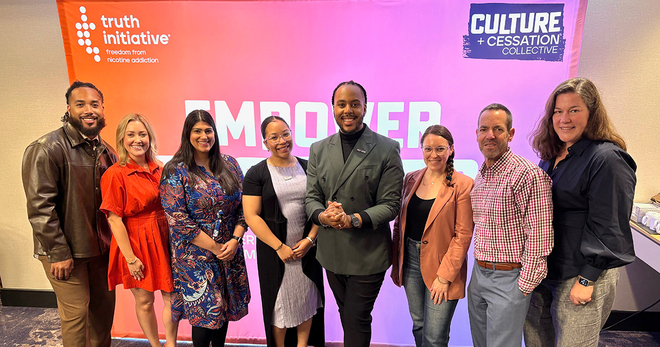6 takeaways from a new report on ending commercial tobacco use
Our vision at Truth Initiative® has long been to achieve a future where commercial tobacco and nicotine use are a thing of the past. We don’t just want to manage or minimize tobacco and nicotine addiction – we want to eliminate it.
A new Truth Initiative report highlights strategies to move toward the end of commercial tobacco use, including policies that reduce the access, appeal, and addictiveness of tobacco products, with the exception of FDA-approved quitting medications. These policies are not prohibition policies, as they do not call for immediate or near-term removal of all commercial tobacco product sales, nor are they directed against individuals who use tobacco. Instead, they are a set of strategies aimed at manufacturers, distributors, and retailers without targeting or criminalizing consumer use or purchase.
With youth cigarette smoking prevalence reaching an all-time low of around 2% in 2022, we have a unique opportunity to harness this momentum as we work to address the youth e-cigarette crisis. We must act now, build on the progress we have made, and take strides to achieve a future where all Americans have the right to live free from tobacco and nicotine addiction.
Endgame policies are gaining momentum
The movement to end commercial tobacco and nicotine use is gaining momentum among public health experts, policy makers, and the general public.
Public support is especially important, since ending tobacco will depend on our ability to shift the societal mindset from one that assumes and accepts tobacco’s continued long-term presence to one that rejects its use entirely.
Recent polling shows that we may be closer to this shift than previously thought. Data from the CDC show that 62.3% of adults support a policy ending the sale of menthol cigarettes, and 57.3% of adults support a policy eliminating the sale of all tobacco products.
At the state and local level, many localities have adopted strong or comprehensive flavor restrictions. San Francisco and Philadelphia, for example, have adopted policies designed to reduce the number of tobacco retailers in their jurisdictions, and over 120 localities across the country have enacted comprehensive flavored tobacco policies that restrict the sales of all flavored tobacco products with no exemptions for any retailers. At the federal level, the FDA proposed a rule in 2022 to eliminate menthol cigarettes and flavored cigars and has also repeatedly announced plans to issue a rule to reduce nicotine levels in cigarettes to non-addictive levels. These proposals, which even 10 years ago were thought to be too radical to consider, are now overwhelmingly supported by public health leaders. With support for endgame policies growing, it is key that we push for continued development of these policies and ideas.
No single policy can achieve a tobacco-free future
Ending commercial tobacco and nicotine use will take a combination of near, medium, and long-term strategies that address the access, appeal, and addictiveness of tobacco products. Some policies can be put into place more quickly, while others will take more time. The timeline for ending tobacco and nicotine use could be influenced by a variety of factors, including public readiness, political will, and availability of evidence-proven quitting programs.
Near-term priorities include:
- Implementing flavored tobacco restrictions
- Restricting points of sale
- Reducing nicotine levels in combustible tobacco products
- Improving cessation access
Medium-term to long-term priorities include:
- Developing new cessation interventions
- Capping nicotine levels and delivery in all tobacco and nicotine products
- Prohibiting sales to younger generations
- Restricting commercial sales of cigarettes and all other combustible tobacco products
Endgame policies can address tobacco-related health disparities
Endgame policies combined with increased prevention and cessation measures have the potential to reduce tobacco-related health disparities that exist among groups who have long been targeted by the tobacco industry. These groups include Black Americans and other minorities, LGBTQ+ individuals, those living with mental illness, and low-income individuals.
We know that the tobacco industry uses product design and marketing to target specific populations. For example, Black Americans have long been targeted by the tobacco industry with menthol cigarettes and as a result 85% of Black Americans who smoke, prefer menthols. Endgame policies that limit where and how tobacco companies can advertise can help ensure that all people regardless of race, gender, or sexual orientation can live free from tobacco industry targeted marketing.
Geographic disparities in tobacco use that have existed for decades can also be addressed through endgame policies. A 2023 Truth Initiative analysis of smoking prevalence across U.S. states found that smoking prevalence is nearly 50% higher in twelve Midwestern and Southern states compared with the rest of the country. Residents of these states often have poorer access to health care, lower income, and are more likely to suffer from smoking-related illness. These states also have fewer tobacco policies in place, and not nearly enough quitting programs to adequately serve the population. State and federal endgame policies can help level the playing field so that all populations can reap the benefits of tobacco policies and access quitting programs.
Strategies must be carefully implemented
Before endgame policies can be implemented, critical considerations must be taken into account to ensure success of these policies and to reduce unintended consequences.
First, access to quitting services must be expanded to help people currently using tobacco products quit. Second, policymakers must ensure that endgame policies are written so they are not aimed at individual consumers, but rather at tobacco and nicotine product manufacturers, distributors, and retailers. Third, strong public education about these policies will be necessary to avoid the spread of misinformation, connect with impacted communities, and educate retailers.
New non-combustible tobacco products are not a solution
The tobacco industry’s introduction of non-combustible tobacco products, especially e-cigarettes, has dramatically changed the product landscape. While the tobacco industry suggested e-cigarettes could help move adult smokers away from cigarettes, they have instead become the most popular tobacco products among young people. Far from being part of the solution, these products have distracted from the conversation about ending the influence of tobacco and nicotine.
Protecting profits over people
The tobacco industry has a long history of shamelessly protecting its profits at the expense of people’s lives. Tobacco companies have spent millions to infiltrate public health and undermine scientific integrity by funding research groups and sponsoring publications rife with unproven claims. Tobacco companies have also infiltrated social media, using platforms popular with young people to spread misinformation, undercut tobacco regulations, and promote their products.
Decisive action is needed immediately
To achieve our vision of a future where commercial tobacco and nicotine addiction are a thing of the past, we must set bold targets and hold ourselves accountable to them. Those in the public health community have the power to advocate for the end of commercial tobacco and nicotine use, and harness public support. We must also continue to hold the tobacco industry accountable for its role in perpetuating tobacco use among young people and targeting Black Americans, the LGBTQ+ community, and other groups in their marketing.
We have come a long way from the days of indoor smoking and TV cigarette commercials, yet there is still much work to be done. It took 50 years to implement smoke-free laws, which still only cover 61% of the U.S. population. We should not wait another half-century, and let millions more die, before ending commercial tobacco and nicotine use for good.
More in tobacco prevention efforts
Want support quitting? Join EX Program
By clicking JOIN, you agree to the Terms, Text Message Terms and Privacy Policy.
Msg&Data rates may apply; msgs are automated.



